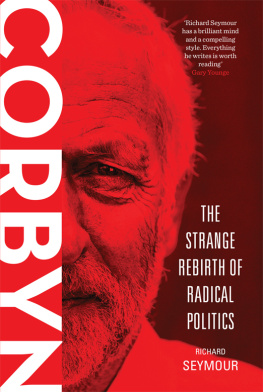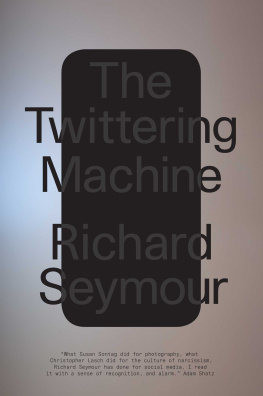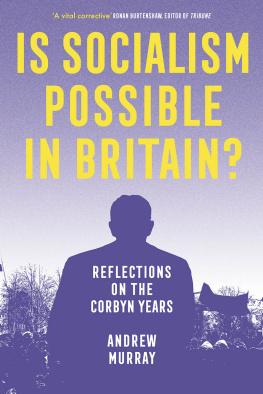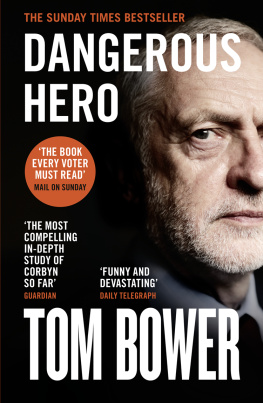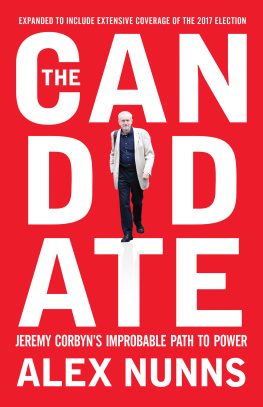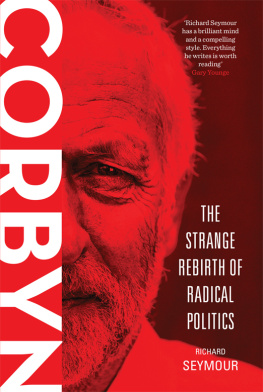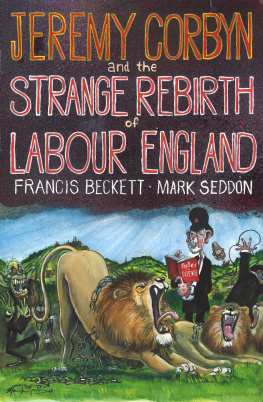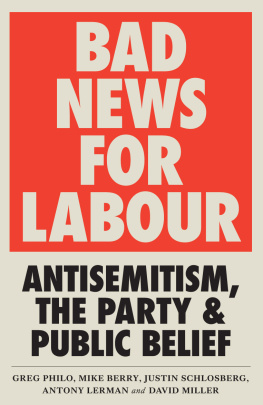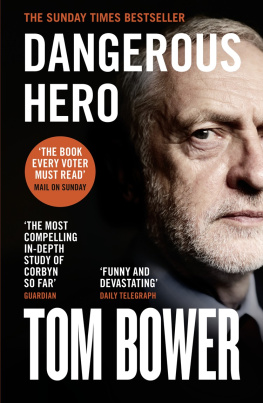This book was proposed, researched and written in a flush of enthusiasm after Jeremy Corbyn won the leadership of the Labour Party a most unexpected occasion for a book. It couldnt have been completed to my satisfaction without the input and encouragement of several friends, colleagues and many Labour members.
Marsha-Jane Thompson, Ben Sellers, Liam Young, Margaret Corvid, Phil Burton-Cartledge and Simon Hewitt were among those who gave up their free time and thoughts, and I gained a lot from their experience and knowledge. Robin Archer at the London School of Economics offered me the benefit of his considerable expertise and thoughtful analyses. Jeremy Gilbert of Compass was also, as always, incredibly insightful.
In addition, there were many individuals, Labour activists, and others who, though too modest to be named, were happy to help fill in the blanks, and explained Labour politics in a way that the mainstream press generally cant. They did this despite knowing that they may not agree with my analysis. Huge thanks to them.
My editor, Rosie Warren, has been amazingly efficient, tolerant and helpful throughout, and Im immensely appreciative of everything she has done.
Finally, thanks to my agent, Susie Nicklin, for her advice, support, insight and hard work in helping this book to come about.
Introduction:
Against All Odds
Theres Something about Jeremy
Early 2016, and Tony Blair is baffled. What with Jeremy Corbyn in Britain, and Bernie Sanders in the United States, he sighs: Im not sure I fully understand politics right now.
His confusion is to be expected. He had warned Labour, to no avail: if your heart is with Jeremy, get a transplant. His former confederate Peter Mandelson joined in, telling that bastion of Labour values the Financial Times that: The Labour Party is in mortal danger. And his old ally and sparring partner Gordon Brown exhorted Labour not to become a party of permanent protest. What more could they have done?
But since Blair left office, the world has been changing, one regime at a time, and he is no longer at ease. Sarkozy has gone, Bush has gone, Aznar has gone, Mubarak has gone, Qadhafi has gone. Soon, his last ally in office will be the Kazakhstani dictator, Nursultan Nazarbayev, for whom he provided invaluable service in managing his image after a notorious regime massacre.
As abroad, so it is at home. Where once the Blairites seemed unshakeable in their power, their ruthless sodality has finally bitten the dust in Labours leadership elections of 2015, when they received 4.5 per cent of the vote. Officially, the burial was executed by an unassuming anti-war socialist named Jeremy Corbyn, who won with a landslide 59.5 per cent of the vote in the first round.
It would be underselling this to call it the most unlikely political comeback in history. It is true that there was a time when socialists operated openly in the Labour Party, unashamed and relatively vocal. Yet rumours of their former power have always been exaggerated. And this is the first time in Labours history that it has a radical socialist for a leader.
It does the novelty of the situation no justice at all to compare Corbyn to Michael Foot, as some commentators prematurely did. Foot was of the soft-Left, and his political roots belonged in a form of radicalised liberalism. Despite a certain amnesia on this point, moreover, he was far more dependent upon the partys right-wing than its hard-Left it was the former which ran the ill-fated 1983 election campaign. His long record of peace campaigning didnt prevent him from supporting Mrs Thatcher in the Falklands, in a way that it is difficult to conceive of Corbyn doing. A closer historical comparison might possibly be made with George Lansbury, a left-wing pacifist with an activist past, who was elected Labour leader in 1931 after Ramsay MacDonalds defection to join a Conservative-led National Government. That one has to look back this far for comparison is a register of precisely how unprecedented the current position of the Labour Party is, and even here it only goes so far: Lansbury had been a popular local mayor and a cabinet member by the time he was elected, whereas Corbyn has held no executive office. That this rebounded to his advantage in this campaign tells something of how unpopular the governing strata has become.
Jeremy Corbyn is one of the last standing Bennites in the Labour Party. Those whose memory of Tony Benn is chiefly of a gentle elder radical in the anti-war movement and incomparable diarist, rather than as a threat to the British establishment hounded by spooks and monstered on the front pages, may not immediately grasp the significance of this. For Benn had been an upper-class rebel, a noble by birth who rejected his title, and a former cabinet minister who had seen inside the vaults of power and concluded that it called for something rather more wide-reaching than mere tinkering. He could, by all accounts, have led Labour himself had he not veered so hard to the left having experienced office. But the experience of office without power, as he described it, radicalised him. Labours problem, he argued, had been that it attempted to manage capitalism rather than do anything to undermine the serious inequities of wealth and power that existed at the time. As a result, it was presiding over a system that was losing legitimacy, generating major discontent, and as a result was in danger of being reversed by the Right.
To remedy this perceived failure, Benn had called for Labour to implement a round of sweeping reforms, akin in its depth and ambition to the achievements of the 1945 Labour Government. This meant redistributing wealth, reforming unelected state apparatuses, and nationalising key industries in order to place them under workers control. One of his major criticisms of the post-war settlement had been that nationalised industries were still not democratic, but run on the same top-down basis as private industry often by the same people. Within the framework of democratic socialism, he argued, it should be possible for parliament to pass laws giving workers the right to manage and to elect their managers. The very idea that Labour should ever aspire to such drastic reforms was precisely what New Labour existed to destroy.

